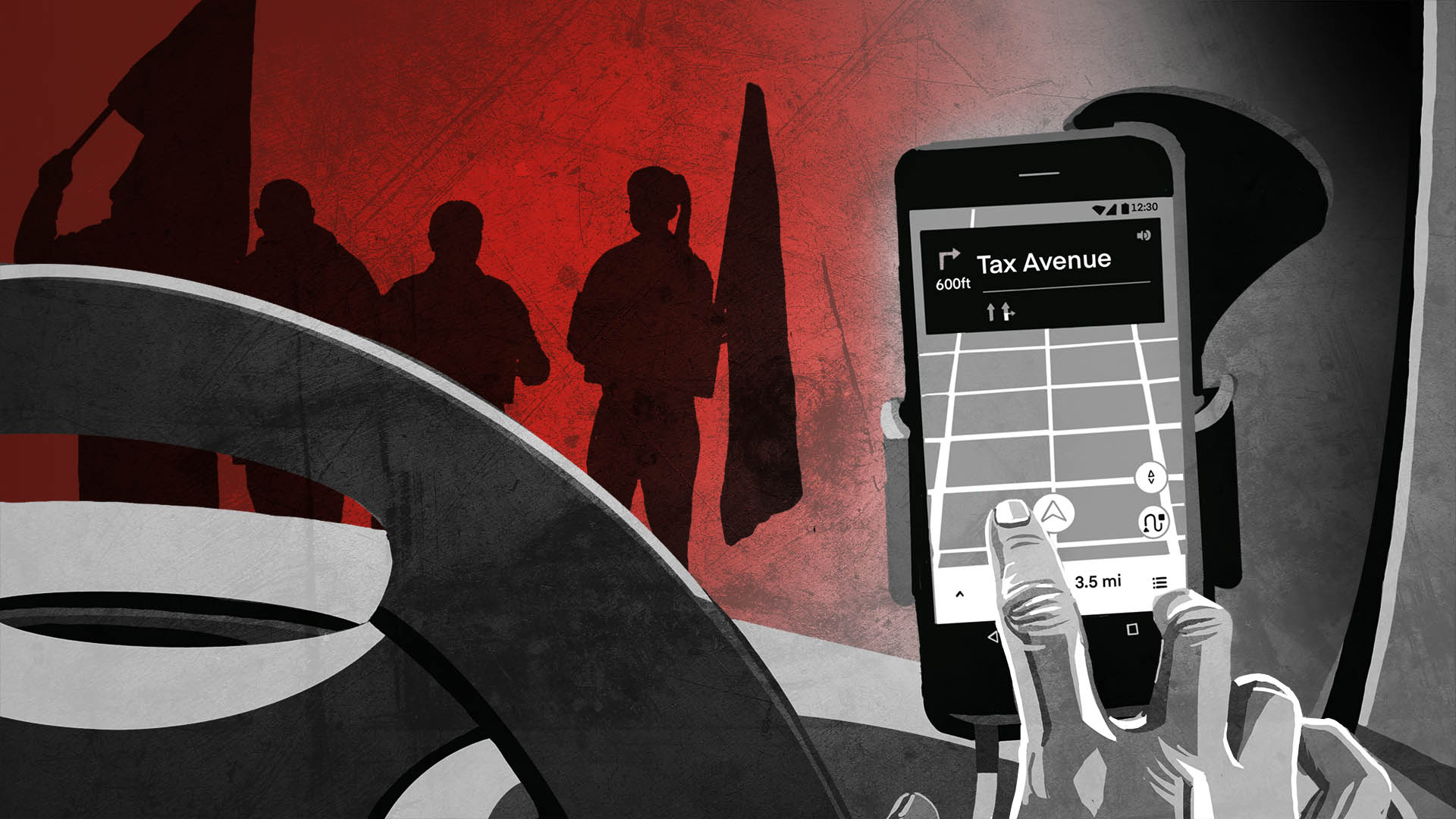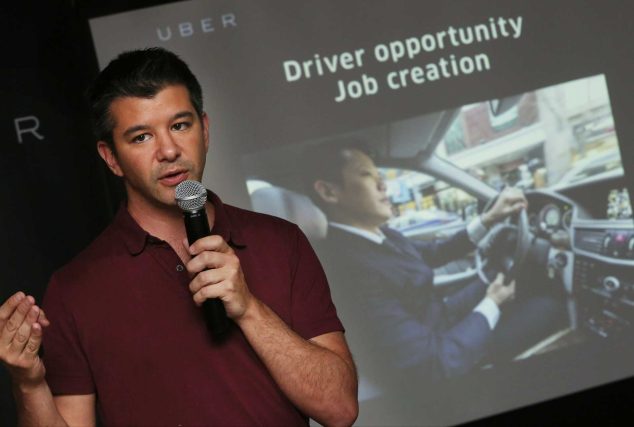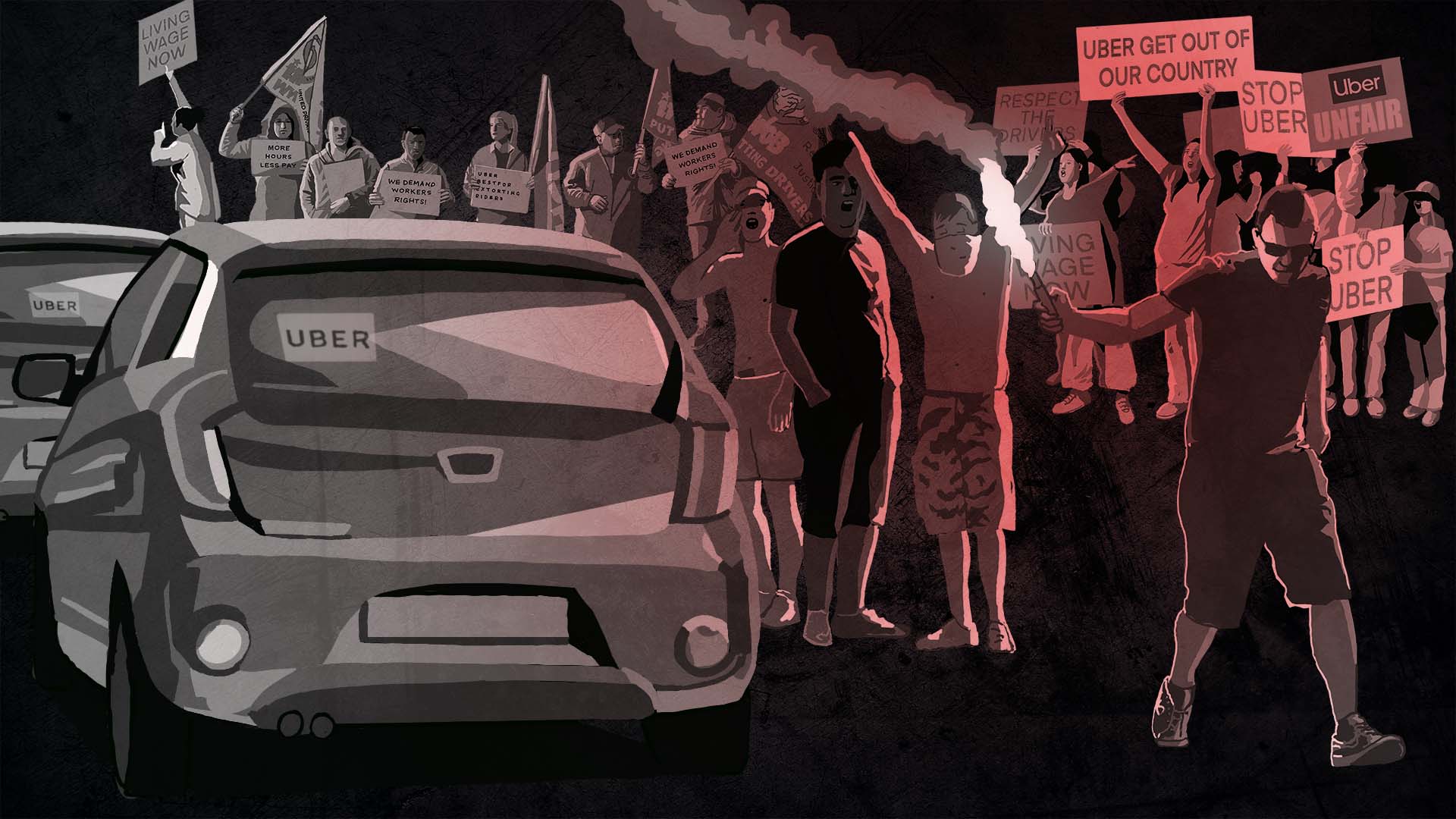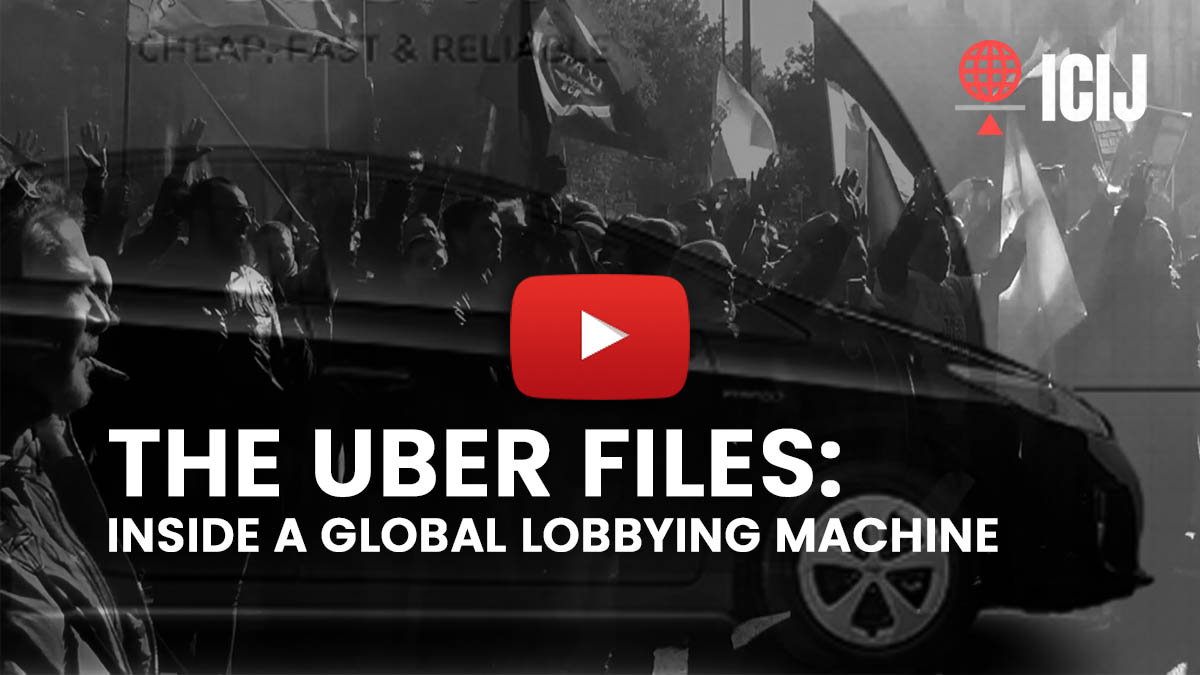TAX SHUFFLE
Uber shifted scrutiny to drivers as it dodged tens of millions in taxes
Executives agreed to share driver data to “contain” a tax audit and deflect from the tech giant’s use of European and Caribbean tax havens, new leak shows.

In early 2015, European regulators were closing in on Apple, Amazon and Google, accusing the U.S. tech titans of unfair competition and abuse of sweetheart tax deals.
Executives at Uber Technologies Inc. took notice; they feared that their company could be next, newly leaked documents show. As it expanded its footprint around the globe, the ride-hailing giant had devised ways to save millions of dollars in taxes by routing profits through Bermuda and other tax havens.
“Our corporate tax structure is — in pure European political terms — the Achilles heel of the company,” Mark MacGann, Uber’s chief lobbyist in Europe at the time, wrote to the company’s tax department chief.
As scrutiny ramped up, the leaked documents show, Uber hit on a brazen strategy to steer attention away from its tax liabilities: help authorities collect taxes from its drivers instead.
In an email to other managers, MacGann declared that sharing information on drivers’ earnings could “contain” the demands of tax authorities. By doing so, Uber could “avoid broadening of the investigation to other countries and/or other tax matters (corporation),” he wrote.
The Uber Files include emails and other internal company documents leaked to The Guardian newspaper and shared with the International Consortium of Investigative Journalists. The records, which date from 2013 to 2017, reveal how executives at the ride-hailing company managed crises, including blowback over its aggressive tax avoidance strategy, as Uber transformed from scrappy Silicon Valley tech start-up to global giant.
The documents also illuminate how governments struggle to make digital companies pay taxes in the countries where they operate — money that could be invested in health care, education and even the roads used by ride-share companies.

Under its founder, Travis Kalanick, Uber became notorious for its macho corporate culture. There were allegations of rampant sexual harassment, spying on rivals and hindering law enforcement investigations.
The leaked records indicate the same cavalier attitude permeated Uber’s approach to tax laws.
According to confidential emails, executives coached regional managers on how to preempt government criticism by talking up “solutions” Uber had devised to ensure that its drivers paid taxes. A digital tax-filing platform tested in partnership with Estonian tax authorities was one of the solutions cited in the emails.
In a 2016 memo about meetings with local African officials, a senior policy manager described how, in Nigeria, the Uber team had successfully shifted the conversation on taxes from Uber to the drivers.
“We met with Tax Authorities in Lagos who lauded our efforts at ensuring [drivers’] tax compliance, and shifted their focus from Uber ‘evading tax’ to working together to ensure [drivers’] compliance,” the manager wrote.
Executives at Uber knew the company’s aggressive stance would attract unwanted attention the documents show.
“Certain topics, such as … corporate taxation are very sensitive and generate a lot of criticism,” Uber manager Pierre-Dimitri Gore-Coty wrote in a memo after a November 2015 call with then-CEO Kalanick.
An Uber subsidiary in Bermuda that held the company’s valuable ride-hailing technology patents was seen as potentially damaging to the company’s reputation. Royalty fees for using the ride-hailing app poured into the Bermuda-based unit, dramatically lowering Uber’s global tax bill.
“It is the Bermuda or Cayman part that really makes so [many] people angry in Europe,” Rachel Whetstone, then-Uber’s communications chief, wrote in an email to executives. “Even just not being part of the Caribbean thing would put us way ahead of the pack when it comes to U.S. tech companies,” Whetstone wrote.
“Anyway just between us as it is the issue that shall not be named,” she wrote, presumably referring to tax avoidance.
Whetstone didn’t comment on Uber’s tax strategy.
Uber argues that it’s not a transportation company but the operator of a digital platform that connects riders to drivers, who are independent contractors, not employees. The arrangement allows the company to avoid a host of costs and responsibilities, such as making social security contributions and collecting value-added taxes on rides.
“Uber is committed to complying with tax laws and regulations wherever we operate … and to enable Uber vendors, partners and drivers to meet their own legal and tax obligations,” company spokeswoman Jill Hazelbaker said in a written response to questions from ICIJ and media partners.
The Dutch connection
Uber’s headquarters in San Francisco occupies two modern buildings facing the bay. But the company’s financial hub, for its activities in much of the world, is in the Netherlands, a corporate tax haven.
In 2012, a few months after its European debut in France, Uber set up a Dutch company, Uber BV, to receive payments from customers hailing cars in New Delhi, London, Sydney and hundreds of other cities around the world.
Uber BV routed up to 80% of each fare back to the driver. It sent most of the rest to its operation in Bermuda, where corporate income isn’t taxed.
The arrangement made it difficult for national taxing authorities to know how much drivers earn because they are paid through the Netherlands.
The leaked documents include an email exchange between lobbying chief MacGann and an Uber spokesman about how to respond to questions from a TechCrunch reporter who had asked why the company’s international headquarters was in the Netherlands, and how taxes fit into the picture.
“There is the potential that anything we say is perceived as defensive at best,” MacGann wrote. “We really need to show that HUNDREDS of major international firms have been locating in [Amsterdam] for decades. … Amsterdam and the Dutch government have shown that The Netherlands is ‘open for business.’”
Uber’s special connection with the Netherlands became evident in spring 2015 when tax authorities from France, Germany, Sweden, the United Kingdom and Belgium contacted their Dutch counterpart to request that Uber BV share driver information.
The authorities wanted to know the workers’ names and dates of birth, license plates, number of trips, bank accounts and other details to determine their tax liabilities, a leaked email says.
The request initially alarmed Uber managers, leaked records show. They feared that authorities would start targeting drivers ー the company’s “supply” ー demanding back taxes from them and sharing data with other agencies. They also worried that drivers would leave the company and work for Uber’s competitors.
In confidential emails to executives, one of Uber’s international tax managers, Rob van der Woude, listed the pros and cons of complying with authorities’ demands.
“Little financial risk to Uber,” he wrote. “Immediate financial liability for partner-drivers.”
As Uber executives discussed how to respond, the company relied on Dutch authorities to buy it more time, leaked messages say.
“The Dutch tax authorities are trying to slow down the sharing of information and will likely do the same should new requests by other countries come up,” van der Woude wrote in an email.
We will ‘ensure partner [driver] compliancy and improve relationship with local authorities,’ the project’s PowerPoint guidelines say. ‘Goal is to become facilitator for tax collection and remittance.’
The documents don’t explain what form the slowdown took. But meeting minutes in the Uber Files indicate that, in April 2015, company executives met with five senior Dutch officials at the Dutch consulate in San Francisco to discuss the company’s activities in the Netherlands and the timing of the audit by the European authorities. The documents also indicate that Uber was accustomed to Dutch authorities’ shielding the company from regulatory scrutiny by other countries.
“This relationship is of great importance and value in light of our corporate structure and tax effectiveness,” van der Woude noted in a confidential message. “The Dutch tax authorities have been collaborative and defensive of us.”
The five EU countries were also investigating Uber to assess whether the company was paying income taxes where it should, and whether it should charge a value-added tax on rides.
“This will be an important battle we need the [Dutch tax authorities] to fight for us,” van der Woude wrote in an email.
After internal discussions in late 2015, Uber managers decided to comply with the driver information request by European authorities to demonstrate that the company took drivers’ tax compliance “seriously,” van der Woude wrote.
Dutch officials had given the company enough time to “get our affairs in order,” he wrote.
In December 2015, van der Woude shared “positive updates” with his colleagues: a contact working for the Dutch tax office had reassured him that, once the countries involved in the audit received driver information, they would “not take a punitive approach” to collecting taxes from drivers.
The officials also would not disclose that Uber provided the information used to remind drivers to pay their taxes, van der Woude explained in an email to his colleagues.
The five EU countries, plus the Dutch tax office, agreed that Uber’s policy not to charge a value- added tax on the service fee was “sound” and would not lead to claims against the company, van der Woude noted in another email.
Both MacGann and van der Woude have since left the company. They didn’t comment on their role in dealing with the tax authorities.
Experts interviewed by ICIJ’s reporting partners said the Dutch officials may have violated local laws if they somehow stalled or delayed European authorities’ request for information, and shared details of the audit with Uber.
A spokesman for the Dutch tax office told Investico reporters that the officials didn’t breach any duty or delay the investigation, and that they didn’t show any “favoritism” toward Uber.
The tax authorities followed the procedures “correctly” and “are strongly committed” to complying with international agreements, the spokesman said. He did not comment on the Uber case.
Uber expected to send the requested information about its drivers to the Dutch tax office in January 2016, and then the Dutch would share it with other European officials, according to the leaked files.
It is not clear which countries received the data at the time. But, in 2018, Danish tax authorities demanded that about 1,200 Uber drivers pay an additional $1.9 million in taxes after analyzing data provided by the Dutch.
In response to ICIJ’s questions, Uber’s spokeswoman said the company is “committed to maintaining an open and transparent working relationship with tax authorities.”
“As part of our tax reporting obligations and tax audits, Uber routinely provides tax data to tax authorities, in line with tax laws and data protection regulations,” she said.
India: ‘Embrace the chaos’
Travis Kalanick’s “love affair” with India started when, as a young coder, he spent a month in the southern town of Varkala, working from the beach, he once said in a television interview.
The second time Kalanick visited the country, he said, was to launch the tech company’s first Indian unit, Uber India Systems Private Ltd., in 2013.

“When we started,” Kalanick said in the interview, “we were actually just thinking about solving a problem, and then it became a problem we’re solving for lots of people. And then, wealth came after it, but it was not just wealth for the people who worked hard on Uber (myself, my co-founder and our employees) but for the population at large.”
The leaked files, corporate records and research by financial experts paint a different picture of Uber’s contribution to India’s economy. They show how the company devised ways to lower its tax bill, fought tax authorities in court and used Dutch subsidiaries to conduct its main business activities in India.
In 2014, months after incorporation, Uber’s Indian operations attracted regulators’ scrutiny. The central bank accused it of not complying with rules on credit card transactions, and tax authorities said the company wasn’t paying service taxes on fares, as required by law.
Officials at the Indian revenue department asked Uber’s manager in India to appear before them and give a statement, according to the leaked files.
Uber hired lawyers — and the accounting giant EY — to fight the authorities’ claims.
“E&Y/lawyers are comfortable with our position that Uber does not carry any ST (service tax) liability,” Axel Martinez, Uber vice president and treasurer, wrote in a PowerPoint overview of tax issues called “Project Robert Dinero.” (The project name appears to be a pun combining the Spanish word for money ー “dinero” ー and a reference to actor Robert De Niro, star of the film classic “Taxi Driver”.)
As Uber lawyers fought the government’s claims, Allen Penn, who then headed Uber’s Asia operations, sent an email to the Indian team with a smiling emoji encouraging it to stay focused and work hard to “dominate the market :)”
“Embrace the chaos. It means you’re doing something meaningful,” Penn wrote in the email. “YOU and UBER are the ones that are improving India.”
Penn and Martinez did not respond to requests for comments from ICIJ and its media partners. EY declined to comment.
By early 2015, it was clear that Uber had lost its first battle with Indian authorities. The finance ministry required all ride-hailing companies to pay a service tax on all ride fares. It also asked Uber to hand over information on drivers, who had to register with the tax authorities. But the company had a solution to the new levy.
In April 2015, Uber announced it would include the service tax in the ride cost. The leaked records indicate that the company wanted to “show commitment to comply” with Indian rules, choosing an approach similar to the one it adopted in Europe.
We will “ensure partner [driver] compliancy and improve relationship with local authorities,” the project’s PowerPoint guidelines say. “Goal is to become facilitator for tax collection and remittance.”
In the following years, Uber appealed several tax rulings in India. It slashed its corporate income tax bill from $35 million to $8 million for the years 2018, 2019 and 2020, according to financial statements. The company received a favorable ruling after challenging tax claims for 2016 and 2017 and was waiting to see if the authorities would appeal, the most recent financial statement says.
India loses an estimated $16 billion to corporate tax avoidance and other tax abuses every year, according to a recent report by the Tax Justice Network.
Global reshuffle
In 2019, former communications chief Whetstone’s suggestion that Uber close operations in Caribbean tax havens was partly realized. Before listing on the New York Stock Exchange, Uber restructured its global business.
A Dutch subsidiary purchased the intellectual property that previously belonged to Uber’s Bermuda shell company, using a $16 billion loan from Uber’s Singapore unit. The move followed the EU’s crackdown on tax avoidance, an Uber spokesman told Bloomberg News.
But the new arrangement had lucrative tax advantages. Uber structured the loan from its subsidiary to reduce its taxable income in the Netherlands by an estimated $1 billion a year for two decades, the term of the loan, according to a report by the Center for International Corporate Tax, Accountability and Research, or CICTAR.
Tax justice advocates were outraged. One called Uber “the Champions League of tax avoidance.”
CICTAR researchers estimated that, in 2019, the year of the IPO, Uber avoided at least $556 million in taxes globally. In recent corporate filings, Uber said it is currently facing numerous audits by tax agencies in the U.S. and abroad.
According to Jason Ward, the CICTAR researcher who reviewed Uber’s arrangements in the Netherlands, India and other countries, companies like Uber “are continually shuffling” their structure in an effort to avoid taxes and confuse tax authorities.
“The more it changes,” he said, “the harder it is to follow.”
Contributors: Romy van der Burgh, Gaby De Groot, Johan Leupen, Jeremie Baruch, Ola Westerberg, Kristof Clerix, Ritu Sarin and Shyamlal Yadav.



